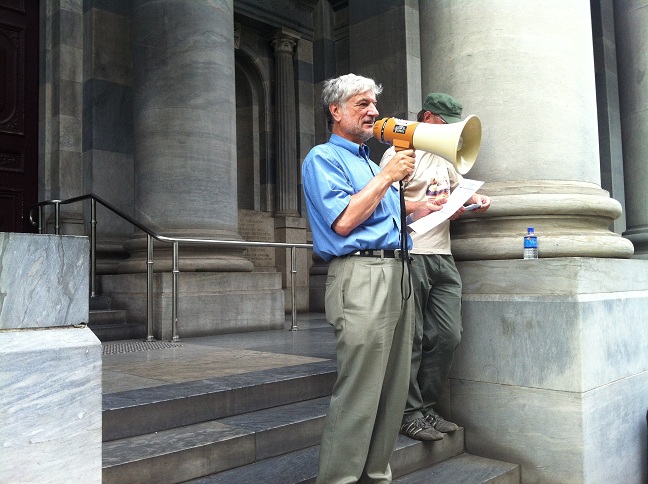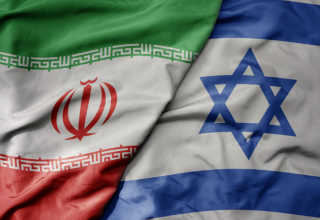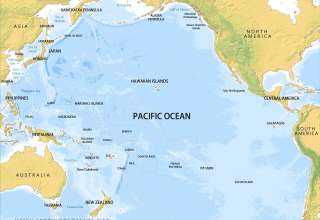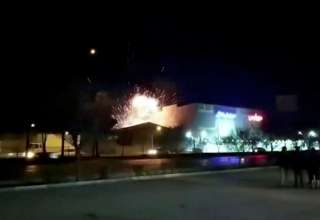
by
Dr Don Longo, University of Adelaide.
Parliament House Steps, Adelaide,
Friday, 30 NOVEMBER 2012, 5.30pm
PREAMBLE
I see your wonderful flags with the Southern Cross today and I see a welcome sight. I see a powerful reminder of the rebels of Eureka and the values they stood for.
158 years ago, today, on 30 November 1854, also in the late afternoon, rebel miners, ‘armed men, sturdy self-overworking gold-diggers of all languages…’, as they were described by one of the participants, Raffaello Carboni, saw the same flag unfurled and put on a mast at Bakery Hill, where a solemn oath of solidary and resistance was pronounced by the miners’ leader, Peter Lalor. [Raffaello Carboni, The Eureka Stockade, Chap. XXXVII]
A Victorian poet, Kevin Hartshorne, writing on the rebellion last year, described the events at Ballarat in this way:
‘In 54 gold miners from many lands erupted
When the precious white peace was by turmoil disrupted
Miners flew a proud republican flag with its Southern Cross
Declaring they’d defend their barricades even at life-loss
And crying defiance of each vice-regal or police boss.’
[Kevin Harshorne, Thunder Down Under: A Verse History of Australia (K. Hartshorne publications, 2012), p. 53]
The Continuing Struggle
The spirit of the miners’ rebellion in Ballarat and the meaning of their struggle against colonial authorities like Charles Hotham and Robert Rede and their accomplices, are never more relevant.
Take for example our national independence:
We’ve had much royalty gracing our shores lately, British royalty with Charles and Camilla, US royalty with Hillary Clinton, the old masters and the new. No doubt they’ve come to remind us that we remain not equal allies, but only an outpost of Great Britain or greater USA.
These royal visits underscore that our sovereignty and independence are still being compromised, one and a half centuries after Eureka and a century after becoming a nation. We now have US bases in Darwin and a continuing subservience to US interests in the region and in the Middle East. Paul Keating was right to remind us recently that respecting our allies does nor mean becoming their servants.
This is not what Eureka was about.
Eureka was for a free and proud Australia, with an independent foreign policy and indifferent to what Carboni called ‘blockheads and aristocratical incapables who’ve never done a day’s work in their lives’, whether they are American or British. [R. Carboni, Eureka Stockade, Chap. XXIX]
Take the condition of Indigenous Australians:
What we still see far too often is the trampling of Indigenous rights by multinational mining companies pursuing their super profits at all costs. Rudd’s ‘Sorry’ ended Howard’s shame; but what’s happened since? How much closer are we to ending the poverty and alienation of Indigenous Australians? Why the silence and continuing inaction?
This is not what Eureka was about.
Some of the Eureka rebels would be appalled by the continuing neglect of Indigenous Australians. I’m thinking of Carboni who lived among the Aborigines of the Loddon Valley, Victoria and was invited to their corroborees. While awaiting trial for the Stockade rebellion in Melbourne 1855, he drafted a little known work, Gilburnia. In there he writes with passionate sympathy about the Aborigines’ plight, condemning their dispossession by an imperial power and denouncing the effects of colonisation on their culture, freedom and identity.
Take the attack on working people’s rights:
WorkChoices is over, but beware of new attacks on unions and labour. No doubt they will come. Gina Rinehart and Peter Reith are still out there, seeking to undermine working conditions and justifying mining companies’ super profits.
This is not what Eureka was about.
Eureka was for demanding and defending rights, fighting for them. And it was about putting profits in the right hands, those of the people, not governments, not mining companies. What’s happened to the super profits tax, so vaunted by Labor? The amount of money it has returned to the people is derisory!
Take Australia’s proud record of multiculturalism:
This great movement was taken to the graveyard by John Howard in 1996 and has been largely passed over in silence by the politicians in Canberra ever since. The consequence has been a demonising of new immigrants, of Muslims in particular, equating them with terrorists and backwardness.
This is not what Eureka was about.
Eureka was the first example of a truly multicultural Australia: German and Irish, French and Italian, Chinese and Americans and Jamaicans – all rubbing shoulders with one another and fighting for a common cause.
And most of all, take our treatment of refugees and asylum seekers:
Yes, the Eureka rebels came from many lands and Ballarat was a multicultural society. How many of your parents or grandparents have come to Australia since the 1940s and 1950s, from Hungary or Greece or Poland or Vietnam or the UK? Some came as refugees, others as migrants, and most stayed. By and large they were welcomed, and their contribution to Australia’s wealth and prosperity has been recognised, even celebrated. They were encouraged to build families and futures in the new country. In the 1970s and 1980s there were great hopes for a mature Australia, for a peaceful, civilised and progressive nation, as the Eureka rebels would have wanted it to be.
But unfortunately the rebel flag needs to do its work again, today, and hold the government of Australia to account for its treatment of people wanting refuge in our country.
Because what we have now is indeed a very different Australia to the one that welcomed refugees from Europe and Vietnam. Instead of welcome, the arrivals are greeted with fear and resentment. They are subjected to deprecation and vilification in the media. They are played for political advantage by cynical politicians of the right and left, who encourage xenophobia and antipathy. We hear things like: ‘stop the boats’, ‘turn the boats back’, and in the last week we’ve even heard oxymorons, that we’re in the midst of a ‘peaceful invasion’. An invasion? – by people who are escaping terror and death, sometimes of our own making! Think of Iraq, think of Afghanistan – who precisely invaded whom? Did not the US with our help invade these countries? An invasion? – by people who courageously make perilous journeys on boats, who ask for the help that we have promised to give them! The Refugee Convention, which we proudly signed in 1951, is clear on this point.
This is not what Eureka was about.
Do you remember in August this year in Canberra – the gnashing of teeth and the wringing of hands in our national Parliament? Bold declarations were made about solidarity and help, and everyone, of the right and left, expressed how caring they were and how incredibly humane they wanted to be. Some even wept! But in the last fortnight, these sentiments have been exposed for what they really were: the tears were crocodile tears, the hands were dirty hands and the declarations were cynical play acting for the cameras. We seem to have gone back to the era of the Tampa, by the very government that condemned it a decade ago. Liberals are at least consistent; Labor has betrayed what it once stood for. How long before we are told again that children have been thrown overboard?
This is not what Eureka was about.
The Eureka flag is a refuge. At the ‘monster meeting’ of yesterday, 29 November, 158 years ago, Carboni called on the 10,000 rebel diggers to salute the Southern Cross. And to the unanimous applause of 20,000 hands the flag was described as ‘refuge of all the oppressed from all countries of the earth irrespective’ – irrespective! – ‘of nationality, religion or colour’. [R. Carboni, Eureka Stockade, Chap. XXIX]
Nothing greater has been said about the flag we carry.
The arrival of the boats is not illegal, not unlawful: Do not let them tell you that it is, because it’s just plain false: their arrival requesting asylum is completely in accordance with both International Law and Australian Law. By signing the Convention of 1951, we agreed to take in any refugee who knocks on our door, whatever their nationality or religion, whether they are rich or poor, male or female, tall or short; whether they have come by boat or by submarine, walked on water or swam, or got off at an airport; irrespective of the time of day or week, whether it’s sunny or wet or windy. It is not illegal to seek asylum, in any way possible. This is what the Refugee Convention says and what we agreed to.
There are no queues: They can’t jump queues that don’t exist. Applying onshore, i.e. once arrived in destination countries like Australia is standard procedure, and is recognised as such by the United Nations. These are not migrants; they are refugees, escaping the daily threat of repression and violence in their own country.
The refugees are not terrorists: This hardly needs a rebuttal, since the evidence speaks for itself. These claims are made to manufacture fear, mostly against Muslims, and to justify the policies of cynical politicians.
Refugees are not shopping around: The media often implies that refugees look for the best deal around, as if fleeing from death and torture, leaving family behind for an uncertain outcome in foreign lands, is akin to a stroll down Rundle Mall.
Australia is not honouring its obligations: All the politicians’ arithmetical gymnastics about quotas and numbers are irrelevant or wrong. Australia does not do its share in accepting refugees: there are 76 countries, some of them far poorer than Australia, which take many more refugees than we do. In fact the UN ranks Australia very low in terms of acceptance of asylum seekers. [www.championsofchange.org.au/?=60]
This is not what Eureka was about.
Australia has now become an example to other developed nations, but unfortunately for all the wrong reasons:
· Australia is the only country with indefinite, non-reviewable, mandatory offshore internment.
· Its Pacific solution and mandatory detention is completely out of step with other western developed nations who have signed the Refugee Convention. In Europe (e.g. Germany, France and Italy) and North America (the USA, Canada) refugees are permitted to live in the community until they are assessed; they don’t spend 5 or more years in isolated islands, in tents, with no privacy, no relief from the heat, no access to the outside world, a prey to boredom and uncertainty, to suicide and mental illness.
· Australia is now a master of political double-speak, straight out of George Orwell: we are told punishment really means deterrence; imprisonment is to ensure safety, and disadvantage is a form of fairness; or that meting out harsh treatment is for refugees’ own good, because it prevents them from escaping the danger they’re in. Go figure!
This is not what Eureka was about.
We have finally said ‘Sorry’ to the Indigenous Australians for all the humiliations they have been subjected to, for the mistreatment they have endured. It took too long, admittedly, but it was done. Rudd was right to do so.
But now we will also have to say ‘Sorry’ to refugees: for their forced incarceration, for unnecessary stonewalling in processing applications, for the years of abuse to people already abused.
And we will also have to say ‘Sorry’ to the UN for signing up to the refugee treaty, the terms of which Australia’s politicians have ignored in the interests of electoral success, and for pretending to be civilised global citizens while flouting every day the principles that we signed up to.
This is not what Eureka was about.
THE SPIRIT OF EUREKA TODAY
We need to end the hypocrisy and the shame. Most of all, Labor must return to its traditional values. I refer to the values of people like Peter Lalor, the leader at the Stockade and later as the people’s representative in the Victorian parliament. I refer to the values of people like Percy Brookfield whose life’s work as a trade unionist and a NSW parliamentarian, from Broken Hill to Riverton (SA), exemplified moral fearlessness, political probity and a life-long commitment to radical change. [Paul R. Adams, The Best Hated man in Australia: The life and death of Percy Brookfield, 1875-1921 (Glebe, NSW: Puncher & Wattmann, 2010)]. Julia Gillard has said that her migration to Australia was a good decision. Then I say to her: live up to the promise Australia made to you and other immigrants and refugees from the 1940s to the 1970s; live up to the promise of a better Australia, the Australia that people like Lalor and Brookfield fought for!
Raffaello Carboni in his great book on the Eureka Stockade said that he ‘had a dream, a happy dream’; it was a dream of a different Australia. [R. Carboni, Eureka Stockade, Chap. XXIX]
This is what Eureka is about.
Today we celebrate this different, better Australia: the Australia of the Eureka rebels, of the disparate multi-ethnic ‘mongrel crew’ as the colonial authorities called them, people like yourselves: Irishmen like Lalor and Hayes, Italians like Carboni, Germans like Vern, Dutchmen like Vannick, African-Americans like Joseph; and women like Anastasia Hayes and Alicia Dunne; and all the others.
They defined what Australia can and should be: prosperous, fair and independent, fighting for the rights of all, citizens or not, refusing complicity with cynical and desperate governments and their servants, with the Hothams and Redes, Gillards and Abbots. And an Australia with a media that follows the example of the Age newspaper during the trial of the Eureka rebels in 1855, a media that is on the side of justice and decency.
This is what Eureka has been about for the last 158 years.
Thus I end where I began: on this day 158 years ago, in the same late afternoon sun, the Eureka flag was unfurled in a scene vividly described by Carboni. ‘Our standard’, he wrote, ‘was a fascinating object to behold. There is no flag in old Europe half so beautiful as the ‘Southern Cross’ of the Ballaarat miners’, which ‘electrified’ them with its ‘magnetism’. He called the event one of the ‘grand sights’ of history. [R. Carboni, Eureka Stockade, chap. XXXVIII]
The flag still exerts its magnetism on us today. It does so because: It speaks to us of resistance – against economic exploitation and political cynicism. It speaks to us of hope – for a multicultural, egalitarian and fair Australia. It speaks to us of dignity – in the face of scorn directed at the most vulnerable. It speaks to us of solidarity – with working people, with Indigenous Australians and with asylum seekers. It speaks to us of the future. Thank you.
Снизу, из лощины, лежащей "Тамплиеры. Книга первая. Рыцарь Феникса." по обе "Все домашние задания 11 кл. Решения…" стороны хребта, никто не мог бы "Хроника времен Карла IX" их увидеть.
Первым его побуждением "Ночь с Ангелом. Очень длинная неделя" было повернуть коня и скакать "Иванов и Рабинович, или "Ай гоу ту Хайфа!"" прочь из ущелья.
Усилием воли Римо "русский стандарт вклады проценты" заставил себя расслабиться.
Мы были фермерами, "Фауст" даже в те времена, когда "Хроники времен Фаины Раневской" здесь еще не ступала нога "Рука Джотто" белого.
Взломать линию фронта и погнать их.
Давай-ка "вклады газбанк самара" посмотрим, на что ты способен.
Он ведь все равно "скачать для crossfire вх" не отличит вас от своей "книга омара хайяма скачать" прабабушки.
Я проведу тебя через оцепление, но для "игра черный кот" этого нужно поторопиться!
Казалось, теперь-то исход погони будет "старые игровые автоматы онлайн бесплатно" совершенно иной.
Нет, "Самые любимые сказки" он ничего подобного не умеет.
Если эти странные существа, "Математика. Учебник для 1 класса. Первое полугодие. ФГОС" скорее скелеты, чем живые "Английский язык. Книга для чтения. 7 класс: пособие для учащихся общеобразовательных учреждений" люди, до некоторой степени еще походили на людей, "скачать мангу магазинчик ужасов" то по духовному облику они были "игры путешествия винкс" сущими дьяволами.
Свертальф, успевший забраться на стул, терся об "Девушка, которая взрывала воздушные замки" ее бедро и мурлыкал.




